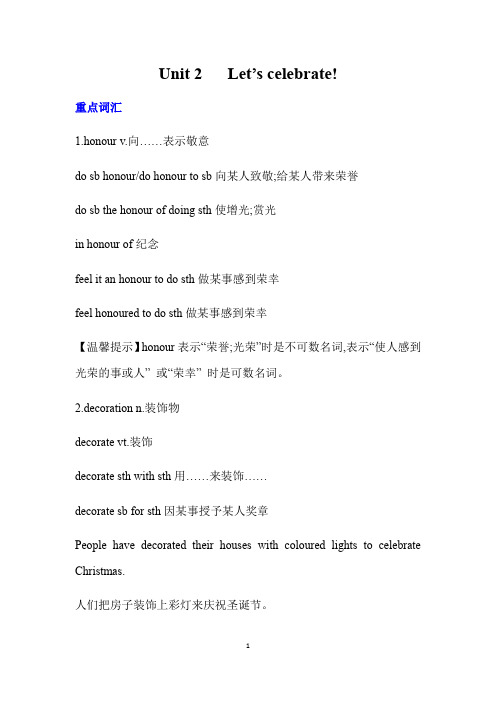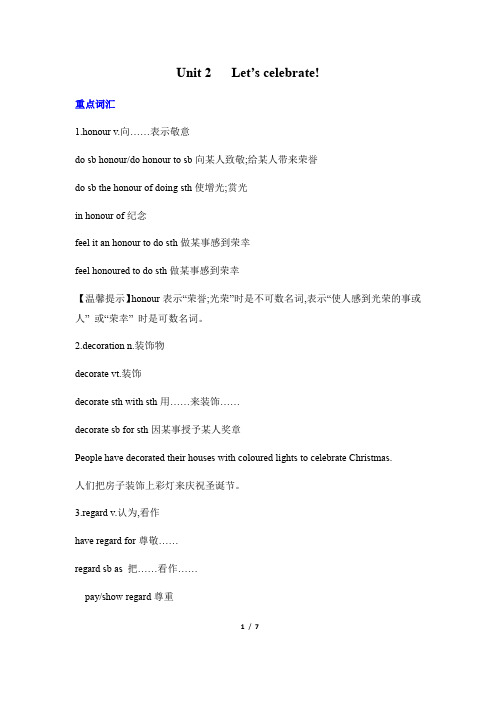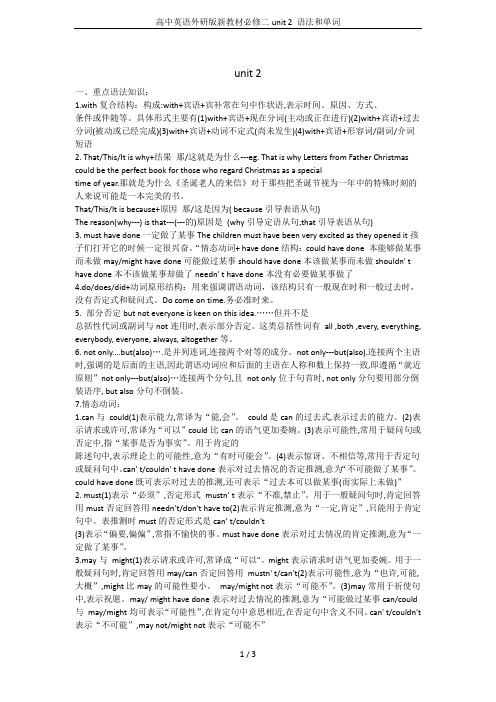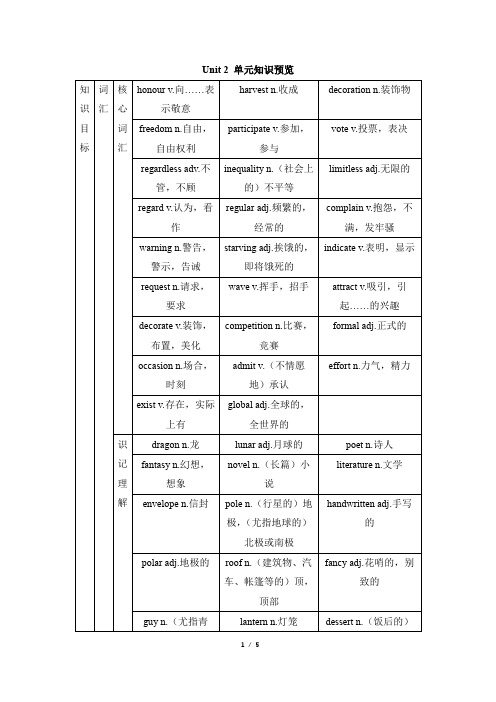高中英语外研版2019新教材必修第二册unit2语法点
高中英语 外研版必修第二册Unit2知识精讲总结

Unit 2 Let’s celebrate!重点词汇1.honour v.向……表示敬意do sb honour/do honour to sb向某人致敬;给某人带来荣誉do sb the honour of doing sth使增光;赏光in honour of纪念feel it an honour to do sth做某事感到荣幸feel honoured to do sth做某事感到荣幸【温馨提示】honour表示“荣誉;光荣”时是不可数名词,表示“使人感到光荣的事或人” 或“荣幸” 时是可数名词。
2.decoration n.装饰物decorate vt.装饰decorate sth with sth用……来装饰……decorate sb for sth因某事授予某人奖章People have decorated their houses with coloured lights to celebrate Christmas.人们把房子装饰上彩灯来庆祝圣诞节。
3.regard v.认为,看作have regard for尊敬……regard sb as 把……看作……pay/show regard尊重with/in regard to关于send one’s regards问候【温馨提示】(1)regard表示“关心”“关怀”等,是不可数名词;表示“尊重”“赞赏”,也是不可数名词。
He is a warm-hearted man and always shows regard for the poor.他是个热心人,总是关注穷人。
(2)表示“问候”,要用复数形式。
Please give him my (best) regards.请代我向他问好。
plain v.抱怨,不满,发牢骚complain (to sb) of/about (doing) sth(向某人)投诉/抱怨(做)某事;(向某人)发牢骚complain (to sb) that...(向某人)抱怨……complaint n.抱怨;投诉;控告make a complaint about/of sth抱怨/投诉某事make a complaint to sb向某人抱怨/投诉5.request n.请求,要求make a request for sth/that...请求;要求……at one’s request应某人的要求request sb to do sth请求某人做某事request that...(should) do sth请求……It is requested that...(should) do sth据要求……6.attract v.吸引,引起……的兴趣attract sb to...把某人吸引到……(to是介词)attract one’s attention吸引某人的注意力be attracted by被……所吸引attraction n.吸引(力);具有吸引力的人或事物have no/a little/much attraction for sb对某人没有/有一点/很有吸引力attractive adj.有吸引力的;引起注意的;引起兴趣的petition n.比赛,竞赛compete in参加……比赛;在……方面竞争compete for 为……而竞争compete with/against...for 为争取……而与……对抗/竞争competition n.比赛;竞争in competition with 与……进行竞争competitor n.竞争者;对手competitive adj.有竞争力的8.admit v.(不情愿地)承认admit sth/doing sth承认某事/做某事admit+n./pron.+to be...承认……是……admit sb/sth into/to...允许某人/物进入……;成为……中的一员be admitted as...作为……被接受admission n.进入;入场费;承认9.effort n.力气,精力make an effort to do sth努力做某事spare no effort to do sth不遗余力地做某事with great effort努力It takes effort to do sth做某事需要努力through sb’s efforts经过某人的努力10.occasion n.场合,时刻on occasion有时;偶尔;间或on no occasion决不(放在句首时引起部分倒装) on this/that occasion在这个/那个时候on the occasion of在……的时候;在……之际occasionally adv.有时;偶尔occasional adj. 偶尔的;有时的11.exist v.存在,实际上有exist in存在于……之中exist on靠……为生there exist(s)...某地有……;存在……existence n.存在;生存come into existence产生;成立;开始存在existing adj.现存的;现行的重点句式1.That is why Letters from Father Christmas could be the perfect book for those who regard Christmas as a special time of year.这就是为什么《圣诞老人的信》对那些将圣诞节视为一年中的特殊时刻的人来说是一本完美的书。
Unit 2 Grammar 课件-高中英语外研版(2019)必修第二册

(2)should ①表示责任和义务,意为“应该”。 ◆The children should be taken good care of. 这些孩子应该受到好的照顾。 ②表示推测,指有一定根据的推测,意为“按道理应该”。 ◆It is three o’clock now.The football match should begin soon. 现在 3 点了。足球赛应该很快就要开始了。 ③表示惊讶,意为“竟会,居然”。 ◆It’s a pity that you should be so careless. 很遗憾,你竟然如此粗心。
3.can (could) have done 表示对过去的某种情况的怀疑或不确 定,一般用于否定句和疑问句中;could 的语气较 can 弱。could have done 还可表示过去本来能做的事情却没做。 ◆He cannot have left.His bag is still in the room. 他绝不可能走了,他的包还在房间里呢。 ◆In my view, this accident could have been avoided. 依我看,这次事故本ould 的语气更加委婉。 ◆Would you please come here to help me? 请你来这儿帮我好吗? (3)表示习惯或特性,以及自然的规律性。will 用于现在,would 用于过去。 ◆Every morning he will have a walk along this river. 每天早晨,他总是沿着这条河散步。 ◆She would do her homework in the library when she studied in the university. 当她在这所大学学习时,她常在图书馆里做作业。
外研版高一英语必修第二册(2019版)-Unit2-单元知识精讲总结

Unit 2 Let’s celebrate!重点词汇1.honour v.向……表示敬意do sb honour/do honour to sb向某人致敬;给某人带来荣誉do sb the honour of doing sth使增光;赏光in honour of纪念feel it an honour to do sth做某事感到荣幸feel honoured to do sth做某事感到荣幸【温馨提示】honour表示“荣誉;光荣”时是不可数名词,表示“使人感到光荣的事或人” 或“荣幸” 时是可数名词。
2.decoration n.装饰物decorate vt.装饰decorate sth with sth用……来装饰……decorate sb for sth因某事授予某人奖章People have decorated their houses with coloured lights to celebrate Christmas.人们把房子装饰上彩灯来庆祝圣诞节。
3.regard v.认为,看作have regard for尊敬……regard sb as 把……看作……pay/show regard尊重1/ 7with/in regard to关于send one’s regards问候【温馨提示】(1)regard表示“关心”“关怀”等,是不可数名词;表示“尊重”“赞赏”,也是不可数名词。
He is a warm-hearted man and always shows regard for the poor.他是个热心人,总是关注穷人。
(2)表示“问候”,要用复数形式。
Please give him my (best) regards.请代我向他问好。
plain v.抱怨,不满,发牢骚complain (to sb) of/about (doing) sth(向某人)投诉/抱怨(做)某事;(向某人)发牢骚complain (to sb) that...(向某人)抱怨……complaint n.抱怨;投诉;控告make a complaint about/of sth抱怨/投诉某事make a complaint to sb向某人抱怨/投诉5.request n.请求,要求make a request for sth/that...请求;要求……at one’s request应某人的要求request sb to do sth请求某人做某事request that...(should) do sth请求……It is requested that...(should) do sth据要求……2/ 76.attract v.吸引,引起……的兴趣attract sb to...把某人吸引到……(to是介词)attract one’s attention吸引某人的注意力be attracted by被……所吸引attraction n.吸引(力);具有吸引力的人或事物have no/a little/much attraction for sb对某人没有/有一点/很有吸引力attractive adj.有吸引力的;引起注意的;引起兴趣的petition n.比赛,竞赛compete in参加……比赛;在……方面竞争compete for 为……而竞争compete with/against...for 为争取……而与……对抗/竞争competition n.比赛;竞争in competition with 与……进行竞争competitor n.竞争者;对手competitive adj.有竞争力的8.admit v.(不情愿地)承认admit sth/doing sth承认某事/做某事admit+n./pron.+to be...承认……是……admit sb/sth into/to...允许某人/物进入……;成为……中的一员be admitted as...作为……被接受3/ 7admission n.进入;入场费;承认9.effort n.力气,精力make an effort to do sth努力做某事spare no effort to do sth不遗余力地做某事with great effort努力It takes effort to do sth做某事需要努力through sb’s efforts经过某人的努力10.occasion n.场合,时刻on occasion有时;偶尔;间或on no occasion决不(放在句首时引起部分倒装) on this/that occasion在这个/那个时候on the occasion of在……的时候;在……之际occasionally adv.有时;偶尔occasional adj. 偶尔的;有时的11.exist v.存在,实际上有exist in存在于……之中exist on靠……为生there exist(s)...某地有……;存在……existence n.存在;生存come into existence产生;成立;开始存在4/ 7existing adj.现存的;现行的重点句式1.That is why Letters from Father Christmas could be the perfect book for those who regard Christmas as a special time of year.这就是为什么《圣诞老人的信》对那些将圣诞节视为一年中的特殊时刻的人来说是一本完美的书。
高中英语外研版新教材必修二unit 2 语法和单词

unit 2一、重点语法知识:1.with复合结构:构成:with+宾语+宾补常在句中作状语,表示时间、原因、方式、条件或伴随等。
具体形式主要有(1)with+宾语+现在分词(主动或正在进行)(2)with+宾语+过去分词(被动或已经完成)(3)with+宾语+动词不定式(尚未发生)(4)with+宾语+形容词/副词/介词短语2. That/This/It is why+结果那/这就是为什么---eg. That is why Letters from Father Christmas could be the perfect book for those who regard Christmas as a specialtime of year.那就是为什么《圣诞老人的来信》对于那些把圣诞节视为一年中的特殊时刻的人来说可能是一本完美的书。
That/This/It is because+原因那/这是因为( because引导表语从句)The reason(why---) is that---(---的)原因是(why引导定语从句,that引导表语从句)3. must have done一定做了某事The children must have been very excited as they opened it孩子们打开它的时候一定很兴奋。
“情态动词+ have done结构:could have done 本能够做某事而未做may/might have done可能做过某事should have done本该做某事而未做shouldn' t have done本不该做某事却做了needn' t have done本没有必要做某事做了4.do/does/did+动词原形结构:用来强调谓语动词,该结构只有一般现在时和一般过去时,没有否定式和疑问式。
Do come on time.务必准时来。
2019外研版高中英语选择性必修二Unit2 单元语法详解课件 (1)

◆ 过去完成时被动语态的构成 ●主语 + had + been + 过去分词,即: 主语 + had + been + done…….. , 请观察以下句子
a. He had been admitted to a key university before he got the news. b. My homework had been finished by that time.
C. had been
D. will
5. Her keys ____C____ in the office so she had to wait until her husband
_____ home.
A. has left; comes
B. had left; would come
C. had been left; came
到去年十二月为止,这座桥已经修两年了
● 表示非真实的过去动作,请观察以下句子
a. If I had been invited, I would have gone with you. b. If the meeting had been held, we would know the information now.
外研版新教材选择性必修二
Unit 2 Improving yourself
单元语法详解
本单元重点语法
→过去完成时的被动语态
◆ 原句再现
a. At the start of the detox, over 100 students had been
persuaded to stop using social media, …..(教材 P14)
高中英语外研版2019新教材选择性必修二unit2语法点

过去完成时的被动语态
1.构成: 过去完成时的被动语态由“had +been+过去分词”构成,表示在
过去某一时刻或某一动作之前发生的动作或状态,句中常用
by,before,until,when等词引导时间状语。
Five new buildings had been built by the end of last year.
到去年年底已经建了五栋新楼。
2.过去完成时的被动语态常用于以下情况:
(1)表示过去某一时间以前已经完成的动作,常与by,before等引导的
时间状语连用。
How many buildings had been destroyed when the hurricane ended?
飓风结束时有多少建筑物被毁?
By the time he got to the school,the first period had been finished.
他到学校时,第一课时已经结束了。
The classroom hadn’t been cleaned before the teacher came.
老师来之前教室还没有打扫过。
(2)在told,said,knew,heard,thought等动词之后的宾语从句中,若表示过
去某一被动动作时,用过去完成时的被动语态。
The boy was reminded that his homework had not been handed in.
有人提醒那个男孩,他的作业还没交。
(3)根据语意可以判断出发生动作先后的被动语态,用过去完成时。
He did what he had been told to.
他做了别人叫他做的事。
Unit 2 Let's Celebrate 知识点清单高中英语外研版(2019)必修第二册

新外研版2019高中必修二U2 Let's Celebrate!语言点知识点【短语】honour an event/a person 纪念某事/某人celebrate the harvest 庆祝丰收take place 发生举行in memory of 为了纪念in Ancient China 在古代中国add...to...把...加入到...中List of Intangible Culture Heritage 非物质文化遗产名录the end of racial inequality 种族不平等的终结keep that magic alive for 相信魔法的存在as long as 只要be regarded as 被视作……be addressed to 收信人是complain about 抱怨.regardless of 不管,不顾in memory of 为了纪念wrap...up (用纸、布等)把……包起来as well as 也,还;和……一样好true spirit of giving 真正的给予精神address sth.to sb.写(收信人)姓名地址prepare Chinese dishes 准备中国菜肴the Lantern fair 元宵节集市receive red envelope from sb.收来自某人的红包decorate A with B 用B装饰Ahold a lantern riddles competition 举办猜灯谜比赛in Renmin Square 在人民广场formal event 正式活动accept the invitation 接受邀请depend on regional customs 取决于当地习俗be dressed as 打扮成……check out .察看,观察put up 建立/造,张贴,提供食宿,举起,提名be keen on 喜爱,热衷于refuse to 拒绝embrace the changes 接受改变a single meal 一顿饭clean up the mess.收拾残局,收拾垃圾eat out 下馆子吃饭with loss of tradition 丢失传统in one's opinion 在某人看来remain the same 没有改变book a table 定了桌年夜饭not only...but(also)...不仅……而且……value our memory of 珍视---的回忆have nothing to do with...和……无关provide a big success 取得巨大成功get/gather together 聚会,聚集feel like 想...look forward to 期待...make use of 利用...interact with sb.和某人互动.sell out 售完,卖光get up on stage 登上舞台【句式】That is why Letters from Father Christmas could be the perfect book for those who regard Christmas as a special time of year.这就是为什么《圣诞老人的信》对那些将圣诞节视为一年中的特殊时刻的人来说是一本完美的书。
高中英语外研版(2019)必修第二册_Unit2_单元知识预览

regard v.认为,看作
regular adj.频繁的,经常的
complain v.抱怨,不满,发牢骚
warning n.警告,警示,告诫
starving adj.挨饿的,即将饿死的
indicate v.表明,显示
request n.请求,要求
wave v.挥手,招手
nationality n.国籍;民族
audience n.听众,观众
interact v.互动
joy n.欢欣,愉快,喜悦
phenomenon n.现象
短语
核心短语
regardless of不管,不顾
regard…as…把……视作……
fancy dress化妆服
as long as只要,和……一样长
attract v.吸引,引起……的兴趣
decorate v.装饰,布置,美化
competition n.比赛,竞赛
formal adj.正式的
occasion n.场合,时刻
admit v.(不情愿地)承认
effort n.力气,精力
exist v.存在,实际上有
global adj.全球的,全世界的
更重要的是,不仅海外的中国公民参加并享受这些活动,许多其他国家也参加了。
语法
Modals(2)情态动词(2):
情态动词could,must,might的含义和用法
能力目标
交际
Extending and accepting an invitation:
In my opinion/For me…
I(don’t) think…
Unit 2单元知识预览
- 1、下载文档前请自行甄别文档内容的完整性,平台不提供额外的编辑、内容补充、找答案等附加服务。
- 2、"仅部分预览"的文档,不可在线预览部分如存在完整性等问题,可反馈申请退款(可完整预览的文档不适用该条件!)。
- 3、如文档侵犯您的权益,请联系客服反馈,我们会尽快为您处理(人工客服工作时间:9:00-18:30)。
情态动词(2)
一、情态动词can与could的用法
1. 表示能力: can用来表示现在的能力, could表示过去的能力。
I can play basketball now, but I couldn’t when I was young.
现在我会打篮球了, 但小时候我不会。
2. 表示请求和许可: could语气比can委婉, 但回答时只能用can。
Can/Could you lend me a hand? 你能帮我一下吗?
3. 表示推测, 意为“可能”。
多用于否定句或疑问句。
—Can he be in the reading room now?
—No, he can’t be in it. Because I saw him in the office just now.
——他现在可能在阅览室吗?
——不, 他不可能在(阅览室)。
因为我刚刚在办公室看见他了。
4. 表示理论上或习惯上的可能性, 意为“可能会”。
Jim can be very annoying. 吉姆可能会很烦人。
二、情态动词may与might的用法
1. 表示征求对方的许可或允许(不用might)对方做某事。
—May I come in? 我可以进来吗?
—Yes, you may/can. 是的, 你可以进来。
—No, you can’t. You may go now.
不行, 你不能进来。
你现在可以走了。
2. 表示推测(把握不大), 意为“可能”, 多用于肯定句。
might比may可能性更小。
He may come, or he may not. 他可能来, 也可能不来。
It may/might rain this afternoon. You’d bette r take a raincoat with you.
今天下午可能会下雨。
你最好带上雨衣。
3. may用于祈使句, 表示祝愿。
May you succeed! 祝你成功!
4. “may/might as well+动词原形”表示“不妨, 还不如”。
I may/might as well start at once. 我还不如马上就开始。
三、情态动词must的用法
1. must表示命令或强烈的建议, 意为“必须”。
All the students must obey the school rules. 所有学生必须遵守校规。
2. 表示十分肯定的推测, 意为“一定; 准是”。
Betty must be in the next room. I can hear her talking there.
贝蒂肯定在隔壁房间。
我能听见她在那儿讲话。
3. 表示说话人的一种态度, 意为“偏要; 硬要; 偏偏”。
Why must he go out in the bad weather? 为什么他偏要在这种坏天气出门?
4. must not表示禁止, 意思是“不许”“不准”“不可以”等。
You mustn’t stop your car in the busy street. 你不能把车停在繁忙的路上。
5. 回答must问句时, 肯定回答多用must; 否定回答多用needn’t或don’t have to。
—Must I finish my homework before eight o’clock?
—Yes, you must.(No, you needn’t.或you don’t have to. )
——我必须要在8点之前完成作业吗?
——是的, 必须。
(不, 没必要。
)
四、“情态动词+have done”的用法
(1)should/ought to have done
两者均含委婉的批评、责备之意。
肯定式表示过去应该做某事而未做, 意为“本应该做……”; 否定式表示做了不该做的事情, 意为“本不应该做……”。
(2)can/could have done
用于疑问句或否定句中, 表示对行为可能性的推测。
could have done用于肯定的陈述句中, 表示与过去事实相反的假设, 表示“本能够去做却没有做”。
(3)may/might have done
此结构表示对过去情况不肯定的推测, 意为“也许做过”, 常用于肯定句, 不用于疑问句; 另外might have done还可表示委婉的责备, 意为“其实(本来)可以做……”。
(4)needn’t have done
此结构表示一种不必要的过去行为, 意为“本来不必做却做了……”, 一般用于否定句或疑问句。
